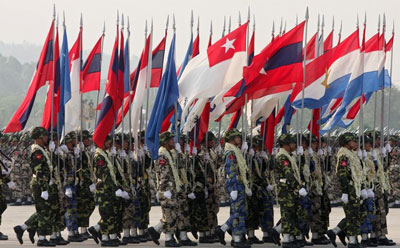
| By MIN LWIN | Thursday, August 20, 2009 |
The Burmese military regime is well on its way to modernizing its military services, including a self-manufacturing infrastructure for the army, navy and air force.
Many of the changes have occurred under the direction of Snr-Gen Than Shwe, who became chairman of the ruling council in 1992.
The Defense Industry (DI) ministry, Burma’s main military industry agency, operates 22 manufacturing or procurement facilities, many located on the west bank of the Irrawaddy River west of the Pegu mountain range.
 |
| Burma army parade during the Armed Forces Day in the administrative capital Naypyidaw on March 27. (Photo: Getty Images) |
Lt-Gen Tin Aye, a trusted Than Shwe ally, is chief of the Defense Industry ministry.
Htay Aung, a Thailand-based military researcher, said that since the military took control of the country in 1988, Burma has steadily expanded its military services and modernized armament production and procurement.
“In Southeast Asia, Burma has the second largest military after Vietnam,” Htay Aung told The Irrawaddy.
“The primary reason for military expansion is that the generals fear that Burma could face an invasion, since it is located between two giant neighbors [India and China].”
The regime also may be trying to acquire nuclear weapons, said Htay Aung.
Late in the1950s, the Defense Industry, or Ka Pa Sa, maintained arms and ammunition production facilities under contract with the Federal Republic of Germany’s state-owned Fritz Werner.
Since then, the Defense Industry network has expanded its infrastructure and today manufactures small arms, ammunitions, land mines and other military hardware. Analysts said the Defense Industry also produces surface-to-surface missiles (SSMs), and may be in the process of exploring ways to build or acquire nuclear weapons.
One facility, the No (2) Defense Industry, located in Upper Min Hla Township in Magwe Division, was built by Singapore, say analysts. The facility is said to produce 60 mm, 81 mm, 105 mm and 120 mm mortars. Singapore is a major source of arms technology for Burma, according to analysts.
The Korean Daewoo Company signed a deal with the government in May 2002 to build an arms factory valued at US $133 million near Prome in Pegu Division. The factory may build or assemble missiles.
No (10) Defense Industry was built in 1993 near Kongyi village in Upper-Min Hla Township in Magwe Division to manufacture surface-to-air missiles (SAMs), air-to-air missiles (AAMs) and rocket launchers. Parts and other material at the No (10) Defense Industry facility are believed to be supplied by South Korea, Russia and China. Defense analysts say the junta may have started a guided missile development program with the help of firms in Singapore.
In the face of an arms embargo by Western countries, the regime now relies on China, South Korea, North Korea and Russia for help in upgrading its military hardware.
The junta’s desire to acquire some form of nuclear weapons has received extensive exposure in the media in recent months, including in The Irrawaddy.
A Rangoon-based company, Soe Min Htaik Co. Ltd, plays a central role in weapons procurement from China, South Korea, North Korea and Russia.
Soe Min Htaik Co. Ltd is a private company that was formed by Burma’s Defense Industry in the early 1990.
Analysts say Soe Min Htaik Co. procured surface-to-surface missiles (SSMs) from China and North Korea.
The Burmese military also has created two military-managed economic organizations: the Myanmar Economic Corporation (MEC) and Union of Myanmar Economic Holding Limited (UMEHL), established in 1989 and 1990 respectively.
The mission of the two commercial enterprises is to make the military services self-sufficient. Heavy weapons, ammunition and other defense technology are acquired with profits from MEC and UMEHL.
The UMEHL has numerous subsidiary and affiliated firms engaged in trading with Singapore, Japan, Malaysia, China, South Korea and India. Cooking oil, fuel oil and automobiles are important imports while exports include cigarettes, beans and pulses, gems, garment products and gas.
UMEHL also has earned hundreds of millions of dollars from the Daewoo Company which has a contract to export natural gas.
Defense analysts have said that Than Shwe has a goal to acquire nuclear weapon capability by 2025.